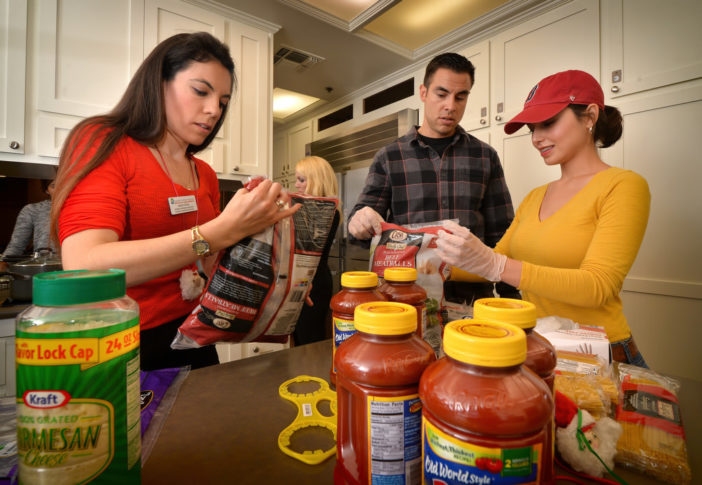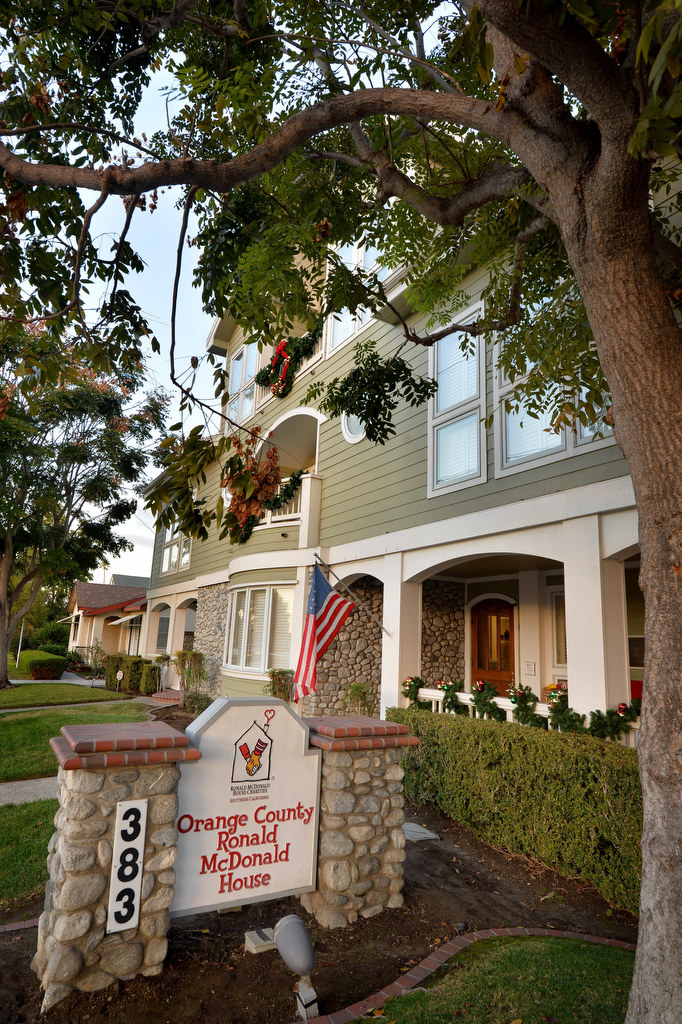Noah never really got into any trouble. A junior at Esperanza High in Anaheim, he runs cross country. And pulls in mostly As and Bs.
Then, a couple of months ago, he got busted giving someone a marijuana cookie. And the police got involved. Suddenly, things were taking a serious turn. There was talk of court. And fines. And punishment.
Fortunately for Noah, he and his parents were given a second chance. The deal: Enter the Community Service Programs’ (CSP) Juvenile Diversion Program and your record is wiped clean.
The goal of the program is to redirect at-risk youth away from delinquency toward education, community service and a future outside of courtrooms and detention. Orange County youth who’ve had run-ins with the juvenile justice system – or are at risk of becoming a statistic – learn how to become contributing members of the community instead.
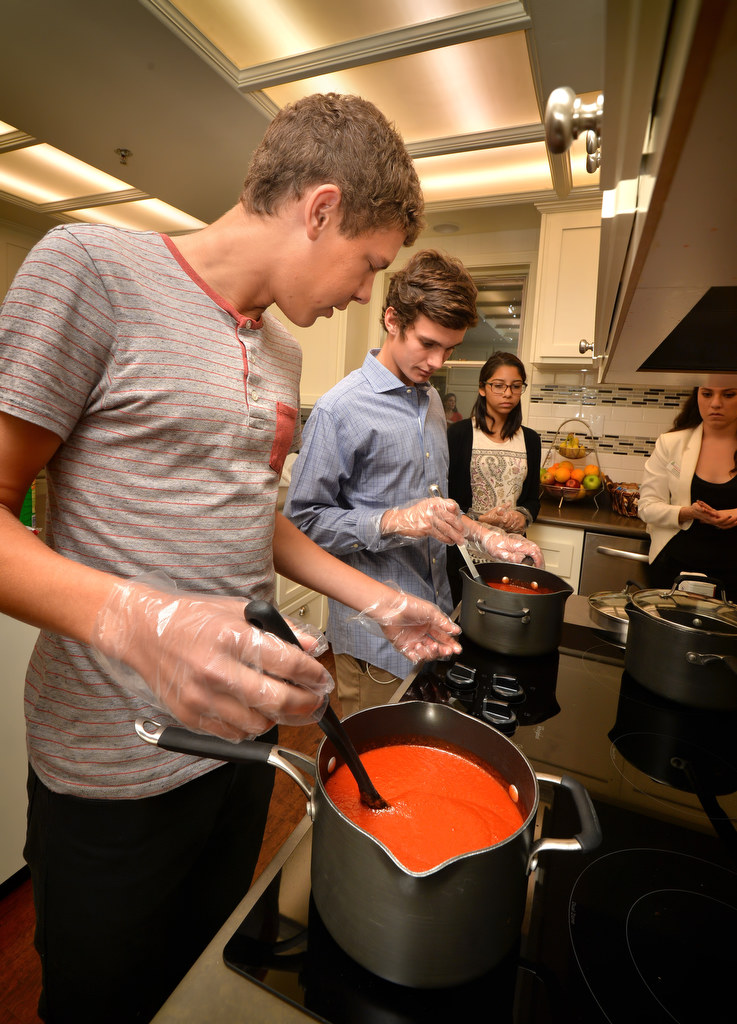
Noah, 16, left, Jacob, 17 and Alejandra, 16, cook sauce to be used for spaghetti for families of patients at CHOC Children’s at the Ronald McDonald House in Orange.
Photo by Steven Georges/Behind the Badge OC
Noah and six other teens spent a December night at the Ronald McDonald House in Orange, preparing and then serving spaghetti dinners to parents whose children were being treated next door at CHOC Children’s.
“This is a last chance sort of thing,” said Noah. “If I do something again it’s straight to court. So it’s sort of a wake up call.”
Plus, he said, “I like it.”
And that’s what program coordinators say what matters most. The idea is to show teens that doing something good can feel good, and seeing others less fortunate can shift a teen’s perspective.
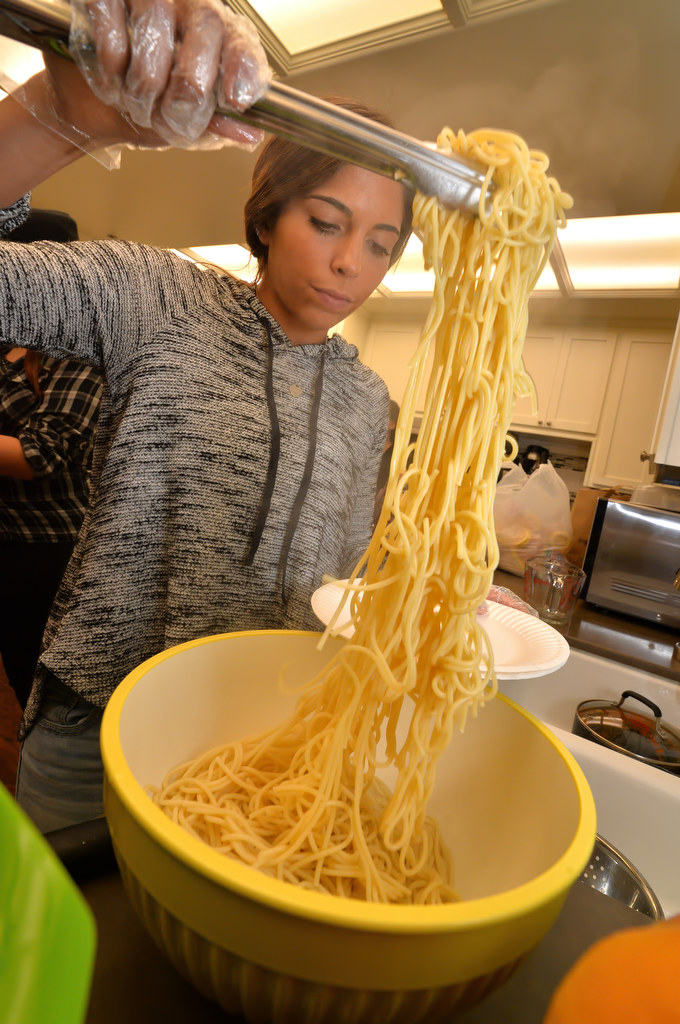
Ana, 17, prepares spaghetti dinners at the Ronald McDonald House in Orange.
Photo by Steven Georges/Behind the Badge OC
“It must be really bad to have a child in the hospital,” Noah said.
Anaheim Police investigator Frank Ramirez is a liaison between the nonprofit program and a handful of Anaheim schools. He’s called to the schools for a variety of student infractions, from drugs to fighting, vandalism to bullying. It’s up to him to either file a police report or refer the student to CSP.
“It’s a great opportunity for the kids to give back, as opposed to just putting them in the system,” he says. “We want to give them the opportunity to do something positive; sometimes that’s the spark that they need. In some ways, it opens up doors.”
Heather Benjamin, the director of CSP Youth Development Programs, says the diversion program was founded in 1972.
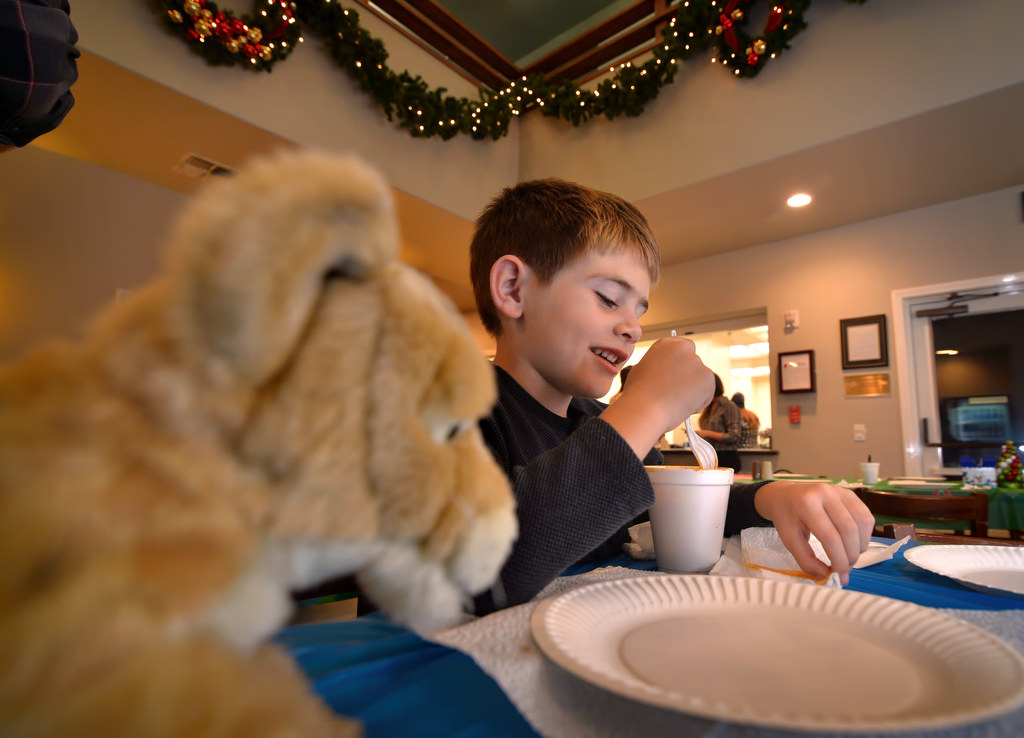
Six-year-old Presley Gaborno of Orange enjoys a small snack with “Lion Cub” as he waits for his mother, Kristen Gaborno, program director for GRIP at Community Service Programs, to help prepare, along with youth volunteers, spaghetti dinners for families staying at the Ronald McDonald House in Orange.
Photo by Steven Georges/Behind the Badge OC
“They were sending kiddos to juvenile hall for things like smoking and curfews, for these little infractions,” she says. “And exposing them to these other offenders.”
CSP Juvenile Diversion is based in Santa Ana but works with six law enforcement agencies, including the Fountain Valley, Huntington Beach, Irvine and Laguna Beach police departments.
The mission: Not to punish, but to stop the behavior. Sometimes it’s a matter of poor choices. Other times there is an underlying problem: family chaos or emotional disturbances.
Every child accepted into the program is assessed by a therapist. A treatment plan is devised. If physical violence was involved, anger management is prescribed.
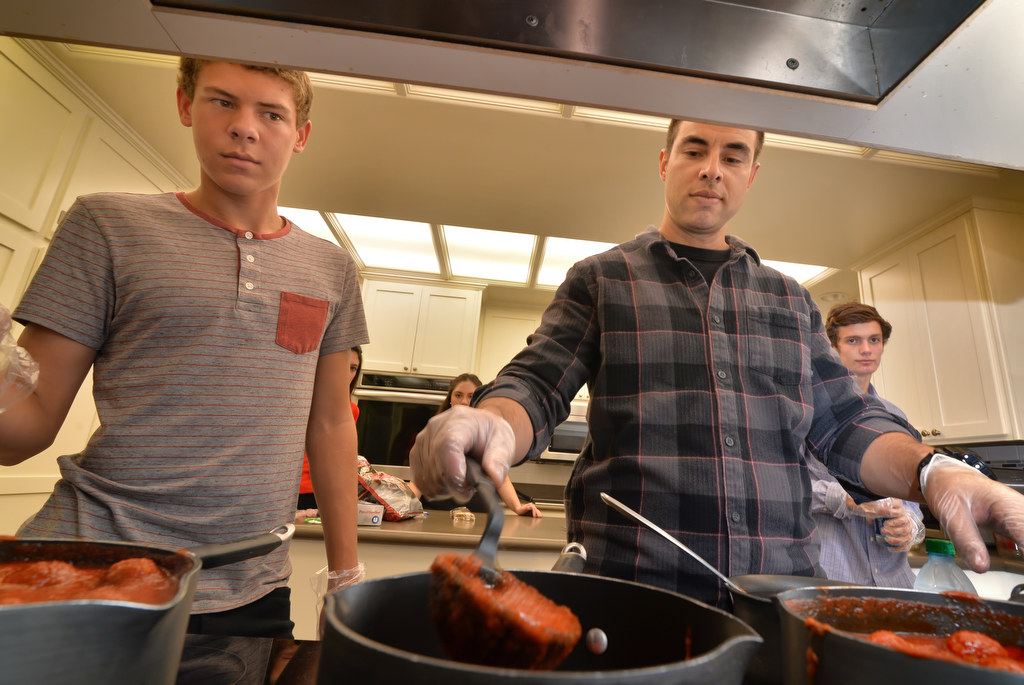
Noah, 16 (left) and Frank Ramirez, an investigator with the Anaheim PD, mix the sauce to be used for spaghetti dinners.
Photo by Steven Georges/Behind the Badge OC
Community service hours are mandatory. The program also requires teens to finish a legal awareness workshop about juvenile crime, and sometimes a drug and alcohol awareness program.
Kids stay in the program from three to six months. Don’t complete the program, and it’s back to court. The program has a 76-percent completion rate. Of those kids, 85 percent do not reoffend.
CSP surveys also show that 90 percent of the kids who go through the program have a more positive view of police departments after finishing.
About 1,000 youths, ages 8 to 18, enter the program each year. Sixty-nine percent are boys.
Benjamin said they would love more police departments to join the program.
The kids aren’t the only ones helped. The program benefits the community, too.
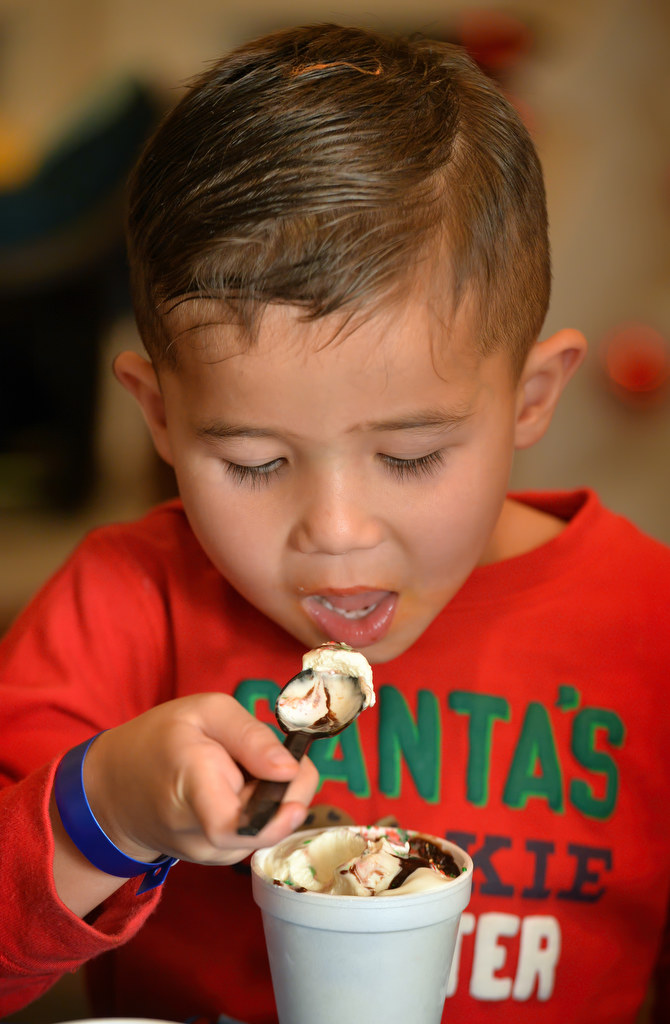
Five-year-old Evan Runyan of Pomona enjoys an ice cream dessert at the Ronald McDonald House in Orange. He and his family have been put up in a nearby hotel, due to the Ronald McDonald House being full, as Evan’s 2-year-old brother, Lucas, is being treated for Kawasaki Disease at CHOC Children’s.
Photo by Steven Georges/Behind the Badge OC
On a recent Friday night, a dozen or so parents who had spent the day by their child’s hospital bed returned to the Ronald McDonald House to find a warm, home-cooked meal waiting on formally set tables.
Stacey was the first to arrive. She was taking a brief break from her daughter Melina’s bedside. The 3-year-old had been checked into CHOC two days earlier with emergency abdominal surgery, complicated by a congenital heart disease. Mother and daughter are from Huntington Park, so Stacey was bunking at the Ronald McDonald House until the ordeal was over.
“This is perfect,” she said of the meal. “I’ve been living on hospital food. This is the first good meal I’ve had since I got here.”
To learn more about Community Service Programs, visit cspinc.org
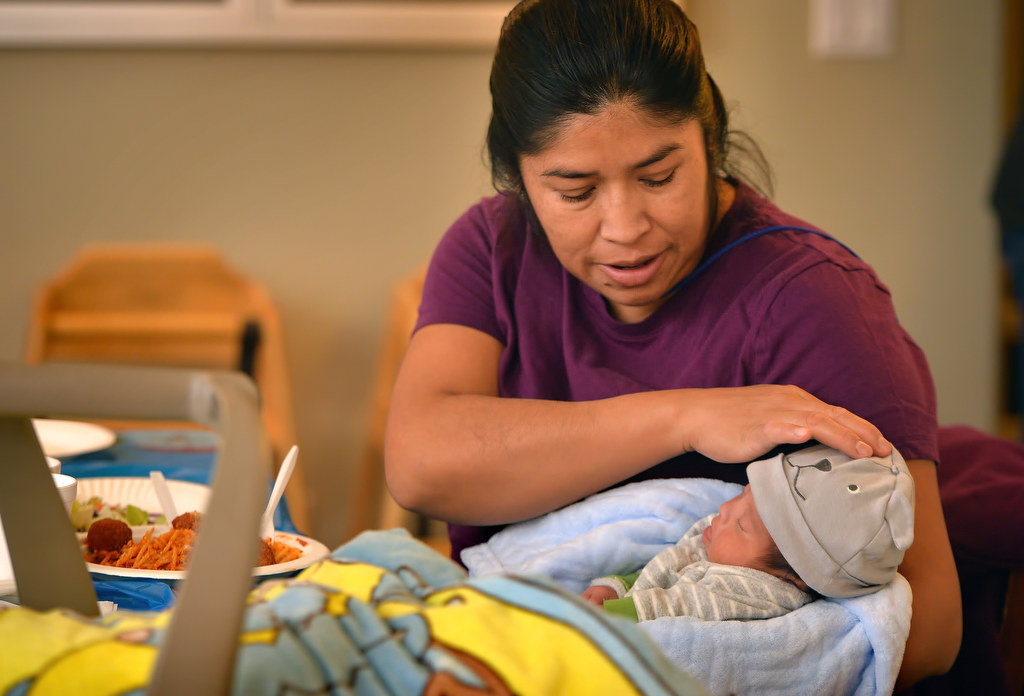
Maria Ramirez of Hesperia tends to her 3-week-old son David as she enjoys a spaghetti dinner prepared by participants in Community Service Programs’ (CSP) Juvenile Diversion program.
Photo by Steven Georges/Behind the Badge OC
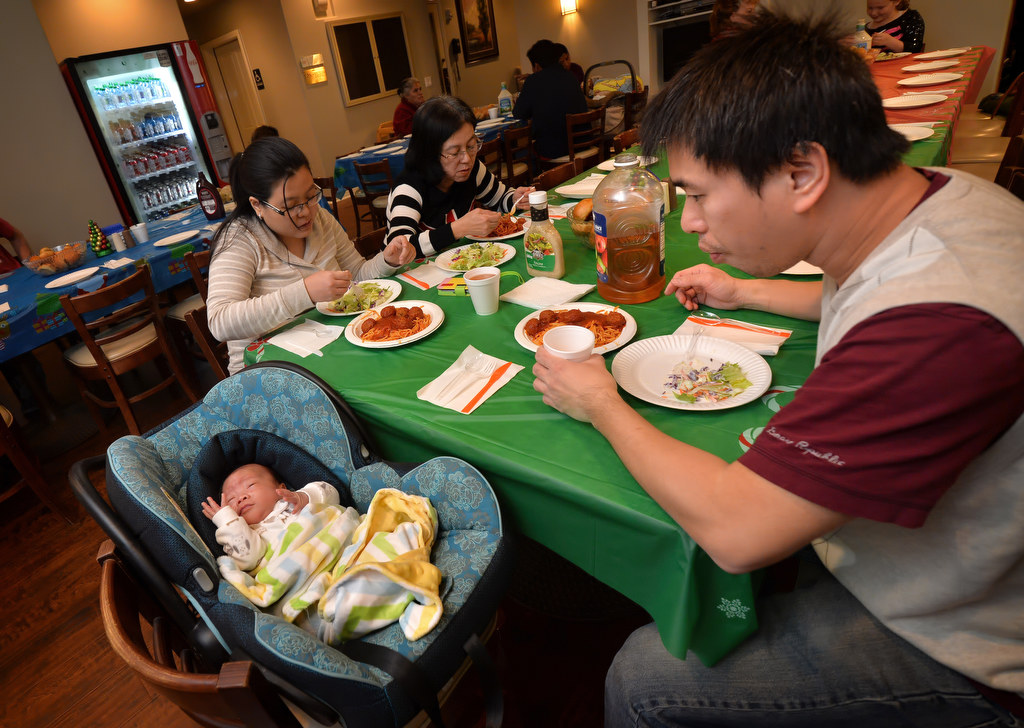
Bud Tio, right, enjoys a spaghetti dinner prepared by youth volunteers as he keeps an eye on his 3-month-old son, Aaron, who was born premature, at the Ronald McDonald House in Orange. Also pictured are Aaron’s mother, Cynthia Cholid, left, and his grandmother, Liani Wati.
Photo by Steven Georges/Behind the Badge OC
 Behind the Badge
Behind the Badge
